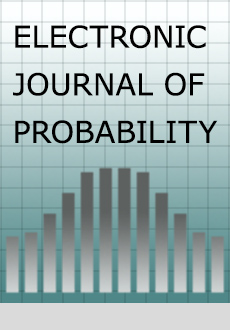Abstract
Consider the random walk on the permutation group obtained when the step distribution is uniform on a given conjugacy class. It is shown that there is a critical time at which two phase transitions occur simultaneously. On the one hand, the random walk slows down abruptly: the acceleration (i.e., the second time derivative of the distance) drops from $0$ to $-\infty$ at this time as $n\to\infty$. On the other hand, the largest cycle size changes from microscopic to giant. The proof of this last result is considerably simpler and holds more generally than in a previous result of Oded Schramm for random transpositions. It turns out that in the case of random $k$-cycles, this critical time is proportional to $1/[k(k-1)]$, whereas the mixing time is known to be proportional to $1/k$.
Citation
Nathanael Berestycki. "Emergence of Giant Cycles and Slowdown Transition in Random Transpositions and $k$-Cycles." Electron. J. Probab. 16 152 - 173, 2011. https://doi.org/10.1214/EJP.v16-850
Information





